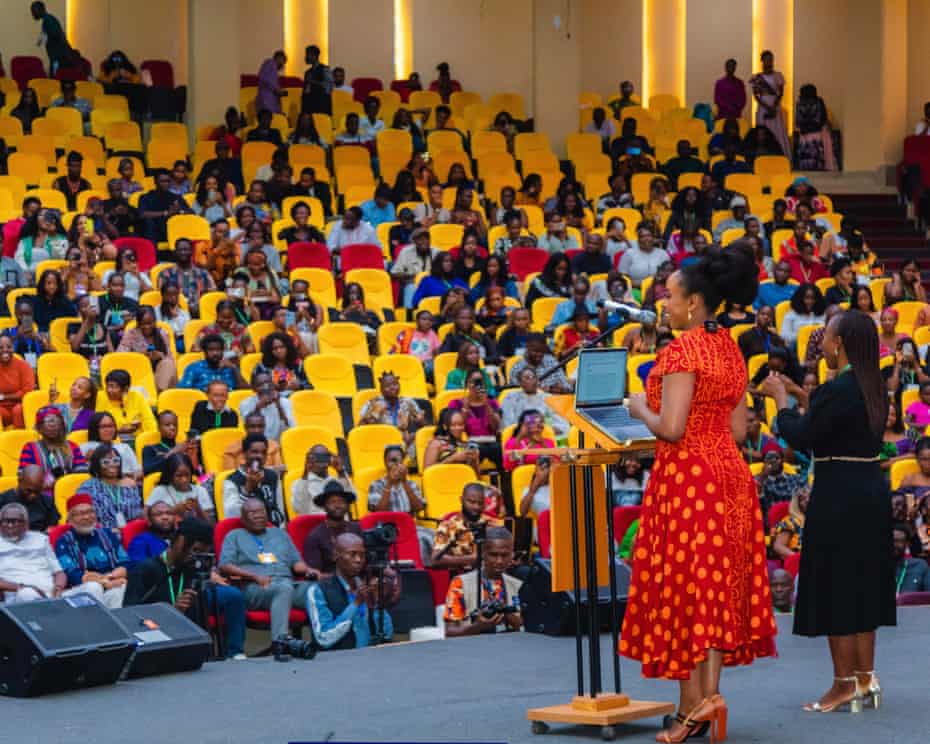
As Chimamanda Ngozi Adichie stepped onto the stage in Enugu, dressed in a vibrant burnt orange African-print outfit and wearing her hair in a graceful afro, the crowd welcomed her with applause and joyful ululations. “It’s always a homecoming when I return to the south-east,” she began. “But it no longer feels like home – the calm, the warmth, the essence seems to have faded,” she added, alluding to the growing violence in the region linked to armed separatists and a recent spike in ritual killings.
Adichie was delivering the keynote address at the closing ceremony of the inaugural Things Fall Apart festival, held to commemorate 67 years since the publication of Chinua Achebe’s landmark novel. Organised by the Centre for Memories in Enugu, the festival builds on the existing annual Things Fall Apart Day, expanding it into a larger cultural celebration. Achebe’s novel, set in the fictional Igbo village of Umuofia, portrayed the clash between African tradition and colonial intrusion, written in response to works like Joseph Conrad’s Heart of Darkness that misrepresented Africa.
Iheanyi Igboko, executive director of the Centre for Memories, said the festival serves as more than a tribute. “Things Fall Apart is not just a book,” he said. “It is a mirror, a declaration of identity, and a provocation. It represents the Igbo worldview and African traditions – and still challenges us today.”
Adichie’s participation also formed part of her tour for *Dream Count*, her first novel in over ten years, which follows the lives of four women navigating questions of love and identity.In her speech, she echoed Achebe’s legacy, urging the preservation of the Igbo language, identity, and culture. She reminded the audience of the historical trauma of the 1967–1970 Biafran War, which claimed around a million lives. She also condemned the ongoing violence tied to separatist movements in the region, which has resulted in more than 700 deaths over the last four years.
“Let us wake up,” she urged. “We often speak of political marginalisation. While that exists, we must pause that conversation until we have cleaned our own house. We must unite. Unity doesn’t mean the absence of differences – it is the decision to come together despite them.” She voiced concern over the erosion of communal values and the rise in ritual killings, particularly targeting women. “Today, we hear grotesquely inhumane stories of people murdered in ritual practices for money. It is important to note that the victims of this recent upsurge of barbarism are mostly women … In Igbo culture, nothing is more sacred than life itself, as *Things Fall Apart* teaches us … we are participating in our own destruction.”
The week-long festival, which began on June 29, recreated scenes from Achebe’s novel. Highlights included theatrical adaptations, dramatic readings, and a live appearance of the Ajofia masquerade, a key symbolic figure in the book. The reimagined Umuofia village featured shrines, huts, a yam barn, a waterfall, and traditional warriors guarding the entrance. Guests were offered palm wine in coconut-shell cups as the Ijele Renaissance theatre group acted out the wrestling match where Okonkwo, the novel’s protagonist, earned his fame.
James Ngwu Eze, one of the organisers, highlighted Enugu’s significance to Achebe and the novel. “Achebe spent many productive years in the city and taught at the University of Nigeria Nsukka. Enugu is also the cultural and political capital of Igboland, and *Things Fall Apart* was set in the Igbo culture.”
Among those in attendance were writers, students, actors, scholars, and artists, including Nollywood veteran Nkem Owoh, who starred in the 1987 television adaptation of the novel. For many, especially the youth, the festival was more than a celebration—it was an awakening. Janeth Sule, a banker, described it as “a reminder to preserve culture and tell our stories.” John Tochukwu, an artist who crafted festival items from coconut shells, said Achebe “helped us see who we are – not as people of darkness, but of dignity and tradition.”
Source: https://www.theguardian.com/








